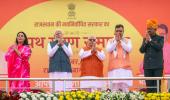Its workers are on their toes to win over the voters once again, with idea of 'Amrit Kaal'.

From December 2023 to early April 2024, the Bharatiya Janata Party has mapped out a series of nationwide programmes aimed at keeping its karyakartas -- the workers who form the backbone of the party's massive organisation -- on their toes.
These programmes are based on the concept of 'Amrit Kaal' (translated by the National Democratic Alliance government as 'the Era of Elixir' in an official release), which encapsulates Prime Minister Narendra Damodardas Modi's vision for a 'New India' by 2047.
This vision includes transforming 'Bharat' into a developed nation that will join the ranks of the First World elite, eradicating remnants of a 'colonial mindset', fostering national pride and unity, and promoting a sense of civic duty among citizens.
The wrapping on this package -- replete with elements of the BJP's world view of cultural nationalism and an 'Akhand Bharat' -- is Modi's persona.
At a recent media conclave, Union Home Minister Amit Anilchandra Shah was asked to spell out the BJP's agenda for the 2024 Lok Sabha elections and to explain the 'magic' that would ensure the Modi government's return for a third term.
'There is no magic,' Shah responded. 'It is Modi's far-sighted vision. We have never had such a hard-working leader who, in 10 years has delivered clean governance, a polity free of caste, dynasty, and community appeasement, and a constructive agenda that has ushered in the politics of performance. As PM, he has motivated the cadre, from the national president to the head of the polling booths.'
According to Shah, the defining feature of Modi's leadership is not just his popularity, but the 'shraddha' (faith or reverence) he inspires in people.
'This won't end easily,' Shah asserted.
The vehicle for disseminating and popularising Amrit Kaal is the Viksit Bharat Sankalp Yatra (Journey to Pledge the Creation of a Developed India), which Modi launched from Khunti in Jharkhand on November 15.
At a meeting with his ministers shortly before the inauguration, Modi explained that the yatra was a crucial effort to inform voters about the Centre's social schemes and asked them to connect with the grassroots by 'participating not as a VIP but as an organiser'.
As many as 2,500 special vans, christened as Information, Education, and Communication vehicles, have been deployed to promote flagship programmes, such as Kisan credit, Ujjwala gas, and rural housing, and are expected to reach 255,000 panchayats and urban areas.
The yatra is being overseen by the ministry of agriculture in the villages and the ministry of information and broadcasting in towns and cities.
The much-awaited consecration of the Ram temple in Ayodhya on January 22 is expected to be another highlight of the BJP's pre-election agenda.
In a demonstration of the coordination between the party and the Rashtriya Swayamsevak Sangh, the RSS directed the Vishva Hindu Parishad and the Bajrang Dal to start distributing akshat (sacred offerings) and encourage people to attend the celebrations, expected to be held simultaneously at several temples to coincide with the consecration.
Since the BJP's inception in 1980, three issues have been at the heart of its politics: The 'liberation' of the temples in Ayodhya, Varanasi, and Mathura, which the party claims were demolished to build mosques; the introduction of a common civil code; and the abolition of Article 370, which granted special rights to Jammu and Kashmir.
While the Ram temple is now a reality, the legally sanctioned surveys of Varanasi's Gyanvapi mosque (by the Archaeological Survey of India) and Mathura's Shahi Idgah mosque by a court-appointed team of advocate commissioners, despite objections, effectively pave the way for fulfilling the RSS-BJP's objective, possibly if the NDA-BJP is voted in again.
The Supreme Court's ratification of the Centre reading down Article 370 and resetting J&K's statehood was interpreted by the BJP as the 'vindication' of its stand against separatism and terrorism.
Speaking on the J&K Reorganisation (Amendment) Bill, 2023 and J&K Reservation (Amendment) Bill, 2023, both of which were passed in Parliament's winter session, Shah pinned the blame for the 'injustice' done to Kashmir on Jawaharlal Nehru's decisions to call a ceasefire with Pakistan in 1949 'when our forces were winning' and take the Kashmir issue to the United Nations.
'If the ceasefire had happened three days later, PoK (Pakistan-occupied Kashmir) would be part of India today,' Shah maintained.
Asked at the media conclave if the Centre planned to reclaim PoK shortly, Shah's answer was 'PoK is ours. Nobody can take it from us', but refused to say more.
On the Citizenship (Amendment) Act, the home minister declared at a Kolkata rally that despite the Trinamool Congress' opposition, the Centre would implement the Act, although the rules have not been framed.
BJP President J P Nadda called a meeting of national and state office-bearers on December 22 and 23 to assess the Viksit Yatra. Of special focus were the Lok Sabha seats that the BJP lost in 2019 and plans to carpet bomb these in 2024.
Feature Presentation: Aslam Hunani/Rediff.com











